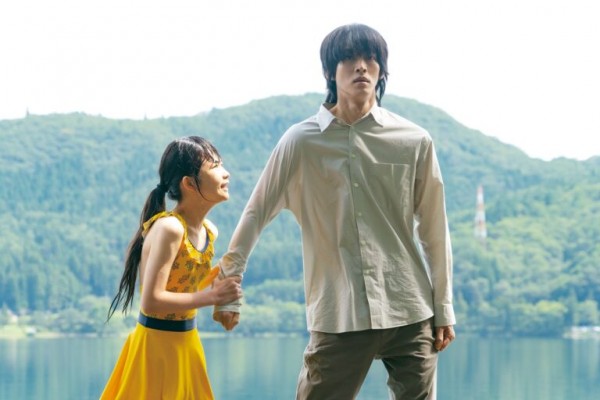SANG-IL LEE: WANDERING 流浪の月(2023) TAMAKI SHIRATORI, TÔRI MATZUZAKA IN WANDERINGSympathy for her kidnapper, 15 years laterWandering
TAMAKI SHIRATORI, TÔRI MATZUZAKA IN WANDERINGSympathy for her kidnapper, 15 years laterWandering is a beautiful and challenging film, pushing boundaries and challenging stereotypes. Tighter editing (even the festival blurb calls it a "sprawling account") would have made it a classic of the genre of sexual adult-child hauntings like Serge Bourguignon's famous 1962
Sundays and Cybèle. This film lacks that haunting simplicity. On the other hand, its complexity is more real, more fully contextual, with more time to ponder the nuances.
Sundays and Cybèle would not play in today's America, nor would a film as open-ended as this be made here.
Sarasa Kanai (young, Tamaki Shiratori) has had a complicated childhood. She was mistreated by her aunt and sexually abused by her 14-year-old cousin. So when a strangely haunted, beautiful young man called Fumi Saeki (Tôri Matsuzaka), hiding under a mop of hair, came up with an umbrella as she sat in a park in a rainstorm, she opted to go home with him. He was 19; she was 10. She lived happily with him for several months: it was the freest and the safest she has ever felt, a time of bliss. She was reported missing, and searched for. When they were found, Fumi was taken to juvenile detention and treated as a sex offender. It's not that simple. Perhaps he
was a pedophile, but it was platonic. He let Sarasa eat as she liked - lots of ice cream and lots of ketchup on her eggs. Being with Fumi was heaven for her, his sudden removal devastating.
Wandering, adapted from a novel by YA writer Yu Nagira, asks us to weigh Fumi's possible "grooming" of Sarasa against the kindness, and the happy space he provided.
We are fifteen years later. Sarasa (now played by beautiful (Suzu Hirose) is twenty-four and works in a restaurant. People know about her past, but nobody has ever understood what Fumi meant to her. She's presently involved with a respectable salaryman, Ryo (Ryûsei Yokohama), who has a good job and family land. But he is the villain of the piece who turns out to be, first, controlling, then, physically abusive.
Her perky coworker Ayumi (Mikako Tabe) takes Sarasa after hours for a drink in an unusual two-storey café. Serving only coffee, it is decorated with soft colors, curtains, old objects, wood furniture. The manager who waits on them is Fumi. He doesn't recognize Sarasa. But he also hasn't changed.
We, and Sarasa, now continue to revisit her preteen moment with Fumi, and now more than ever it seems to have been her happiest of times. Rather than reintroduce herself to Fumi, Sarasa becomes a regular customer — and nighttime stalker. When she discovers that Fumi has an adult girlfriend (Mikako Tabe), she begins to feel jealous. Ryo finds out, and Fumi now knows Sarasa.
What can we make of this? As Mark Schilling describes the film in
The Japan Times the story "unfolds on the borders between manga-esque fantasy (Nagira once wrote 'boys's love' comics and their influence shows) and the harsh realities of Japanese society, in which hate on the internet can be overwhelming and everlasting." It is perhaps this navigating back and forth over such gulfs that slows down
Wandering to an almost dreamlike pace, heightened by the fact that as Fumi, in a striking performance, Tôri Matsuzaka is almost trancelike. Suzu Hirose also has long, dreamlike pauses. One is more than ever aware of the minimalism and meaningful silences of Japanese speech and how much is left unsaid.
The Korean-descent, Japanese-born-and-raised Sang-il Lee is a bold explorer of difficult issues (as his 2010
Villain and 2016
Rage have shown) who is also capable of marshaling a top-notch cast and splendid crew, including in the latter notably the cinematographer Hong Kyung-pyo (
Parasite) and composer Marihiko Hara. Schilling comments that Hong shoots "with steely precision and elegiac beauty." The last hour isn't up to the first ninety minutes, and though the transitions between moments in time is seamless and subtle, the editing could have moved things faster. Still, a haunting and troubling experience. One of the most beautiful films of Japan Cuts 2023.
Wandering aka Wandering Moon 流浪の月, 150 mins., debuted at Jeonju Apr. 30, 202, showing at half a dozen other Asian-film festivals. Theatrical release in Japan May 13, 2022. Screened for this review as part of Japan Cuts (July 26-Aug. 6, 2023), showing at the Japan Society Tues., Aug. 1, 2023 at 9:00 pm. (Beside Schilling, also reviewed by Richard Gray in
The Reel Bits and David Erlich in
IndieWire.)





